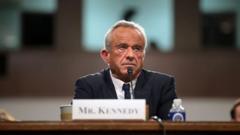Robert F. Kennedy Jr. took the stage for his initial Senate confirmation hearing as President Donald Trump's nominee for U.S. health secretary on Wednesday, drawing significant attention and mixed reactions from both senators and the public. This pivotal role, responsible for guiding federal health policies, including medical research and food safety, is central to the administration's health agenda.
Kennedy, known for his controversial views on vaccines, was questioned rigorously about his previous statements regarding the Covid-19 vaccine and the broader vaccination landscape. He led the organization, Children's Health Defense, which has long raised doubts about vaccine safety and has been accused of propagating discredited theories, including the false link between vaccines and autism. In response, he stressed that he endorses current vaccination practices, arguing for enhanced safety studies rather than an outright opposition to vaccines.
The hearing saw interruptions from protesting groups, juxtaposed with moments of applause when Kennedy articulated his vision to improve national health. "We will reverse the chronic disease epidemic and put the nation back on the road to health," he declared, while also targeting the processed food agenda that he believes contributes to public health crises.
Addressing his evolving views on abortion, Kennedy aligned himself with his new party's directives, suggesting that abortion must be regulated by state governments, a shift from his former pro-choice stance. He described each abortion as a tragedy while asserting that he would prioritize the president's policies over his previous beliefs.
Senator Bernie Sanders challenged Kennedy on healthcare accessibility, probing whether foundational human rights include guaranteed healthcare for all. Kennedy’s cautious answers regarding chronic illness and healthcare costs prompted Sanders to critique the pharmaceutical industry's practices, highlighting Americans' higher expenses compared to their European counterparts.
The tone of questioning varied significantly, reflecting partisan divides: Republicans showered Kennedy with commendations for his health initiatives, while Democrats pointedly challenged his previous anti-vaccine remarks. As the hearing came to a close, Kennedy earned some backing from prominent GOP senators, yet faced criticism for lack of clarity and consistency in his responses.
Kennedy's journey continues, as he gears up for another round of questioning in a subsequent hearing that will further assess his suitability for the critical role. This nomination saga encapsulates the intricate intersection of health policy, public trust, and political allegiance.





















